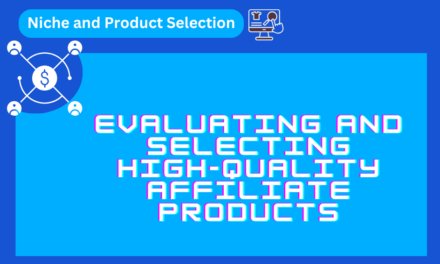In the world of affiliate marketing, it’s easy to get caught up in the excitement of promoting the latest product that promises to earn you big commissions. However, not all affiliate products are created equal. While some products may be heavily marketed and seem enticing, they may lack the quality or value your audience deserves. This can harm your reputation as an affiliate marketer and may even result in low conversion rates. So, how can you avoid promoting low-quality products and focus on offering real value to your audience?
1. Understand Your Audience’s Needs and Pain Points
Before diving into promoting any affiliate products, it’s essential to know who your audience is and what they truly need. By understanding their challenges and goals, you can better evaluate whether a product will genuinely help them or if it’s just a shiny object with little real-world value.
- Research your audience: Use surveys, social media feedback, and analytics to get insights into what your audience struggles with.
- Ask questions: What problems are they trying to solve? What solutions have they already tried? This will guide you toward finding high-quality products that genuinely add value.
2. Look for Products That Align With Your Niche
To build trust with your audience, it’s important that the products you promote align with your niche and resonate with your audience’s needs. Promoting a product outside of your niche can confuse your audience and hurt your credibility.
- Stick to your expertise: If you’re in a specific niche like digital marketing or health and wellness, focus on products that fit within that area.
- Avoid scattershot marketing: Don’t chase every trending affiliate product. Stick to promoting products that solve real problems in your area of expertise.
3. Evaluate Product Quality and Reputation
Not all affiliate programs vet their products thoroughly. As a result, it’s up to you to ensure that the product you’re recommending is high-quality and reputable.
- Research the product thoroughly: Look for independent reviews, testimonials, and real-world feedback. Check online forums or social media groups where users share their experiences with the product.
- Check the brand’s reputation: Is the company behind the product known for delivering quality? A strong, trustworthy brand is a good indicator of a quality product.
- Test the product yourself: Whenever possible, try the product or service yourself. This not only builds trust with your audience but also allows you to give authentic, firsthand reviews.
4. Focus on Longevity and Value
Affiliate marketing isn’t just about making a quick sale—it’s about building long-term relationships with your audience. Promoting low-quality products may lead to quick commissions, but it will hurt your credibility and turn off potential buyers in the long run.
- Consider long-term value: Will this product be beneficial to your audience in the long run? Does it provide lasting results, or is it a one-off purchase that offers little ongoing value?
- Promote evergreen products: Look for products or services that stand the test of time. These tend to have solid reputations and are more likely to keep your audience satisfied.
5. Don’t Rely on Hype and Marketing Gimmicks
Many affiliate marketers fall into the trap of promoting products that are marketed with flashy ads, high-pressure sales tactics, and overblown promises. While these products may generate quick sales, they’re often of low quality and will lead to unhappy customers.
- Question the hype: If something seems too good to be true, it probably is. Avoid products that make unrealistic promises or appear too perfect to be real.
- Focus on value, not hype: Look for products that have a clear, realistic value proposition. They should solve problems effectively, rather than just offering empty promises of success.
6. Look for Transparency and Clear Communication
A reputable affiliate program should provide transparency regarding how they operate, the product’s features, and any potential risks or limitations. If you’re left in the dark about important details, it’s a red flag.
- Examine the affiliate program details: Are they upfront about commissions, terms, and conditions? Do they provide clear information on how the product works and who it’s for?
- Read the fine print: Ensure the product’s features and benefits are clearly communicated, and there are no hidden catches.
7. Test the Product’s Support and Customer Service
A great product is only as good as the customer support that comes with it. If the product you’re promoting is difficult to use or lacks adequate support, it could lead to negative reviews and refunds.
- Evaluate customer support: Try reaching out to the product’s support team with any questions. How responsive are they? Are they helpful and professional?
- Look for user-friendly features: Products that offer helpful tutorials, documentation, and easy-to-reach support are likely to have better user experiences.
8. Build Relationships With Affiliate Partners
Having a strong relationship with the affiliate program providers can help you gain insider knowledge about the products you’re promoting and ensure you’re only recommending the best.
- Ask questions: Don’t hesitate to reach out to the affiliate manager or product creators to learn more about their offerings.
- Look for transparency: A good affiliate partner will be willing to share information about the product’s performance, potential challenges, and how they plan to improve.
Conclusion
As an affiliate marketer, your reputation is your most valuable asset. To build trust and credibility with your audience, it’s essential to focus on promoting products that offer true value and align with your audience’s needs. Avoid falling into the trap of low-quality affiliate products and instead focus on offering high-quality, trustworthy products that genuinely improve your audience’s lives. By doing so, you will foster long-term relationships, ensure customer satisfaction, and ultimately drive more sustainable affiliate income.















